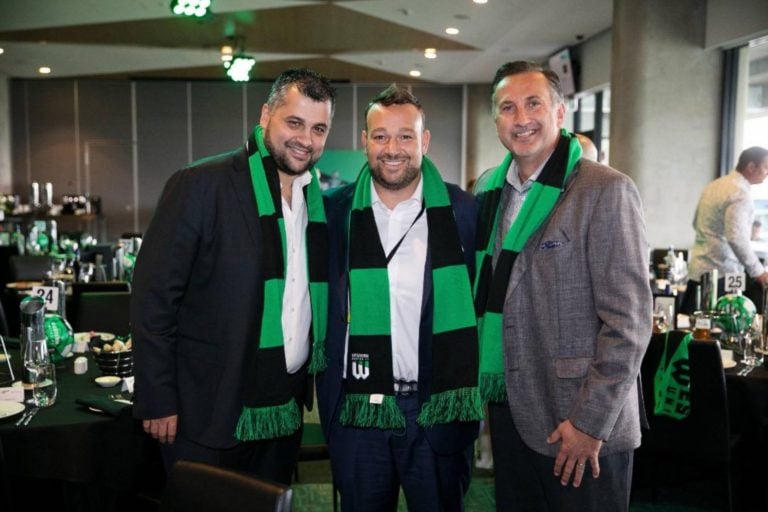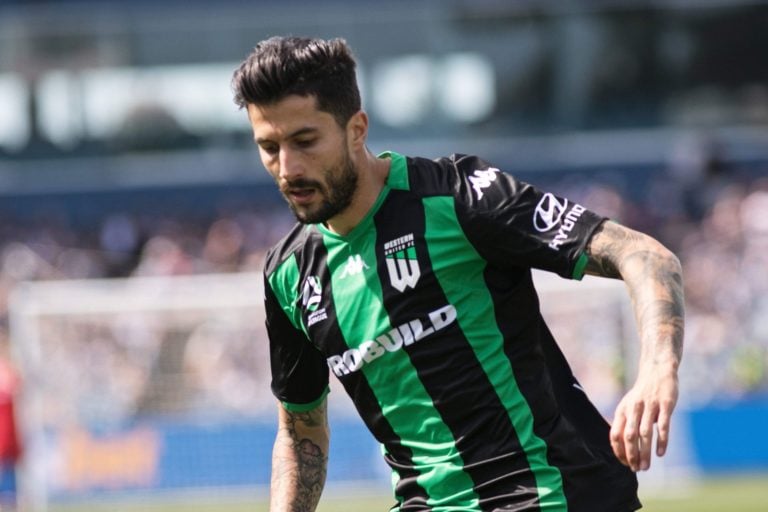Western United is one of the newest clubs to be introduced to the Hyundai A-League. In its first season as part of the competition, they have done relatively well, impressing with their performances and even beating some of the heavyweights such as Melbourne Victory and Adelaide United.
Yet now they’ve been forced into a state of limbo due to the COVID-19 restrictions. Speaking to Neos Kosmos, the club’s Chief Executive Officer, Chris Pehlivanis, explains that they remain in a good financial position when compared to most other teams in the tournament.
The Greek-Australian has great experience in the world of football as he began his career playing in the academies of East Bentleigh and Moorabbin City. An injury forced him out of professional play, yet his love for the sport kept him within the field but from a different perspective – that of professional referee, a role he has held for over 12 years within the state leagues.
At the same time, he completed a course on financial studies at RMIT, before going on to earn his Masters in Business, Administration and Management from the University of New South Wales.
Pehlivanis was the financial manager of the Football Federation of Australia (FFA) for two-and-a-half years before joining the Essendon Football Club in the AFL in a similar position (Head of Finance).
But he couldn’t stay away from his favourite sport for too long and seeing the great prospects by Western United, he decides to join up with them, in what is already a very promising inaugural season.
READ MORE: Greek Super League clubs hit dead end with players over contract negotiations
Chris, what made you leave the safety of Essendon to return to football with Western United?
That’s a good question… The main reason would be the love and loyalty I have for Australian football. For me this was a great challenge. Sometimes in life you need to take the plunge and so I decided it was worth the risk. When I met up with the board and they analysed their plan to me, which included the creation of a new stadium and the upgrade of the area, I couldn’t help but say yes. I love the idea of being a part of something that is growing now which could make me proud in the future.
How many members does the club have?
A bit over 5,000. In my opinion, for our first season that number is fantastic. I have faith that they’ll keep growing. It’s my dream that we can be in a position where we can have at least 10,000 members when we enter our new ground in Tarneit.

When will the new stadium be ready and what will be its capacity?
With everything going on in the world right now, we might have a small delay. Our target was for it to be completed by our third or fourth season. But now with COVID-19, I’d say closest to the fourth season, meaning 2022/23. But we’ll have a clearer opinion within the next few months. We remain optimistic that work will be able to begin by the end of the year, assuming things go well with the virus. Our new ground will be a fantastic facility that fits 15-18,000 people and it will be the only privately owned stadium within the A-League.
Kardinia Park (Geelong), Mars Stadium (Ballarat), VU Whitten Oval (Footscray): Which is the ideal home ground for Western United for the next three-four years?
We’re a club that belongs to the city’s western suburbs. At the current stage I believe that it’s ideal to remain as close to our future stadium as possible. We need to keep playing some of our home games in Ballarat and Geelong, but our base needs to be close to Tarneit. For now, we’re examining the potential of playing at the Whitten Oval, the Knights Stadium or the Chirnside Park that belongs to the Werribee Tigers, which is the closest to our future stadium. At the same time, I like the idea of having one or two double-headers at the AAMI Park. That would be a move that could help the sport.
READ MORE: Lockdown in Oakleigh – a Melburnian Greek girl returns to her roots
The pandemic has affected the entire football world both domestically and internationally. How do you see things coming out of the crisis?
I can confidently say that we are in a good position and that’s because, as our name suggests, we remain united as a club trying to find solutions during these trying times. We’ve maintained contact with the players and the training staff. It was necessary to stand them down and we’re not the only club to make that difficult choice. From the moment that you have no revenue, it is impossible to keep paying your staff. It’s only a temporary situation that I feel will be over very soon. Yet there is uncertainty for the future of the league with the whole Foxtel situation. The temporary halt to all the leagues combined with the closure of all athletic facilities have created new developments, but I remain optimistic that we will be able to find a good solution for the upcoming season. Even if the deal (between Foxtel and FFA) goes on with a reduced amount, we will proceed to make cutbacks in a similar fashion to the rest of the leagues around the world. The past two weeks we had a few positive developments that make me feel even more optimistic. The tri-monthly payment (worth $12 million) was made by Foxtel and the potential to resume the season in August remains wide open, which means that soon we could begin training. All A-League clubs are in contact with one another and I assure you that we all have a common philosophy and we’re working with the ambition of creating an even greater competition.
What is your opinion of Western United’s coach Mark Rudan, his assistant John Anastasiadis and the Greek international Panagiotis Kone?
We’re very fortunate to have Mark Rudan at the team. In his second season within the A-League, he’s already proven his quality as a manager. He is a very hard working man, he has developed young players such as Jerry Skotadis, Max Burgess, Apostolos Stamatelopoulos, etc. John Anastasiadis has spent his entire life on the football grounds. He has great experience and good communication with Mark. As for Panagiotis Kone, he is an already well-established footballer. He works with professionalism and has helped us develop a strong culture at the club. Our move to acquire him has proven to be quite successful.

What do you think of the new chief executive officer of the FFA, James Johnson?
I don’t know much about him. What I do have to say is that he has a good background, with great experience in football. I think it’s great that his main objective is to bring all the different sides together.
Uniting football, that’s something we hear a lot of.
Maybe football isn’t the most popular sport in the country, but it does have a powerful asset that I believe we’ve yet to take full advantage of. For quite a few years now, we remain the top sport in participation across all ages and genders. Unfortunately we haven’t worked on that which is why we aren’t united. In order to have a brighter future and greater potential as a sport, we all need to work together; the FFA, us A-League clubs, the state federations and all NPL and state league clubs. We need to introduce new ideas in order to make the sport more attractive for the crowds so we can bring back the great atmosphere to the grounds. For example, we could introduce a pre-season tournament here in Victoria, with the participation of our club, Melbourne Victory and Melbourne City, alongside the greatest NPL sides. That’s a move that could bring us all closer.
Could you tell us your opinion on the potential of a second division?
I’m all for it and we need to have a second division just as they do in the rest of the world, yet I feel we’re not quite there yet. It would be disastrous if we were to rush this because if this move were to fail then the sport would end up in an even worse position than it is right now. The most important issue we need to deal with is the lack of appropriate facilities. On the one hand, you’ve got these big stadiums with no atmosphere and a great maintenance cost such as the Suncorp in Brisbane and on the other there’s small grounds in the state leagues that lack the qualifications to host games of the highest level.
Adaptation by Alex Anyfantis
